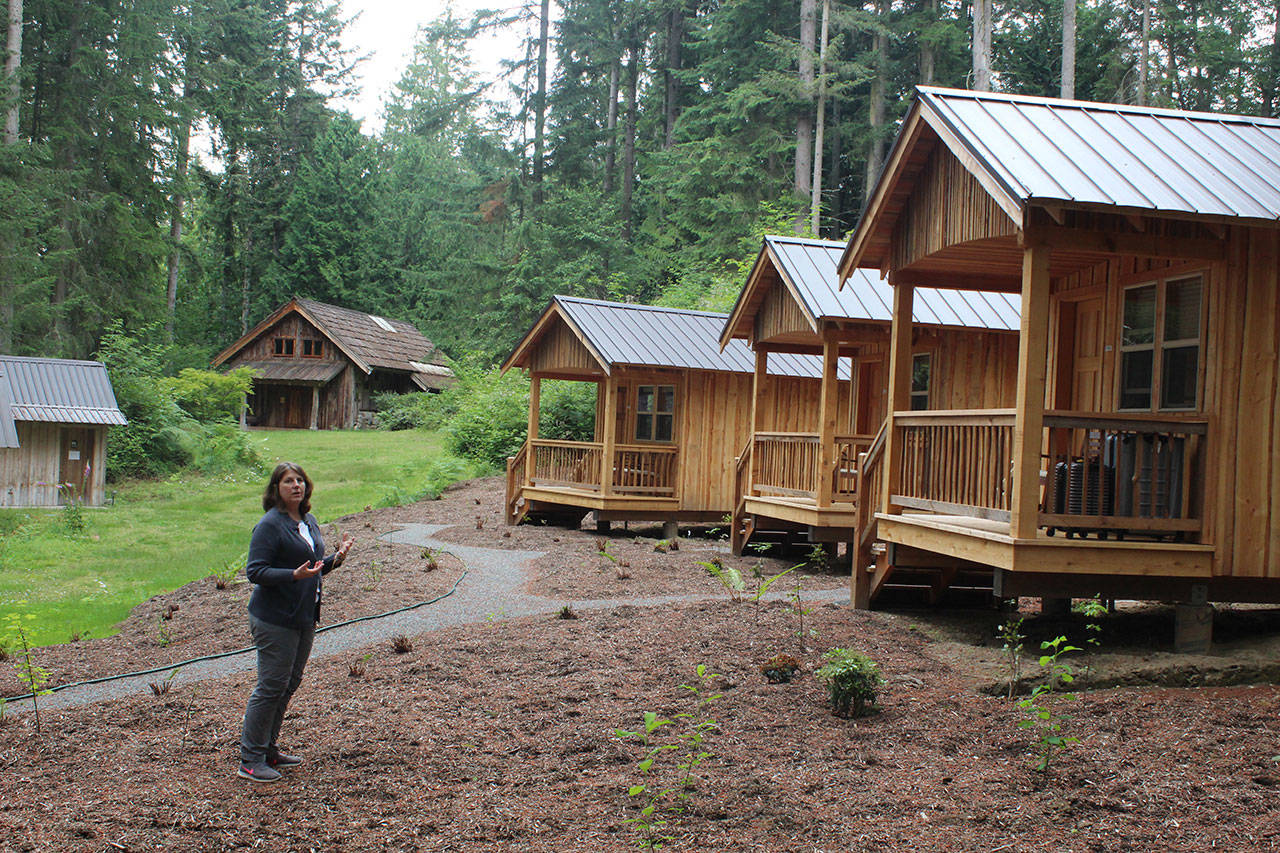More heads in beds is something to celebrate at Whidbey Institute.
For years, the learning and leadership retreat has been able to accommodate 50 people in its dining hall and about 150 people in its conference center.
But it had only 27 beds in various structures, including a renovated farmhouse built in 1917.
A four-year, $4.5-million fundraising campaign began last year aimed at expanding lodging and other structural improvements by 2020.
To date, $1.5 million has been raised, which allowed construction to begin last November.
Seven new cabins, including one that’s designed for wheelchair accessibility, now line the main segment of the campus on Meadow Row.
“Going from 27 beds to 43 beds is a huge deal for us,” said program director Holly Harlan as she gave a tour.
“It’s kind of like we’re right-sizing, finally catching up to what we’ve needed for a long time.”
The additional beds provide $150,000 in extra earned income for the organization. It operates on a $1-million budget and employs the equivalent of 10 full-time workers. About 60 percent of its budget is generated through its lodging services with donations and grants comprising the rest.
Sunday, July 1, from 11 a.m. to 3 p.m., Whidbey Institute is hosting a community open house with a picnic, live music, garden tours and brief updates on its expansion.
For some, it may be their first time on the 108-acre campus. For others, including many financial backers, it will be a chance to celebrate a new chapter of a revered retreat.
Whidbey Institute represents many things to many people — an annual getaway for the body and soul, a nearby place to explore four miles of public hiking trails, a community gathering space, an outdoor classroom and a learning think tank disguised as a summer camp.
For others, it means nothing at all.
“For many people, they moved here because of the Whidbey Institute,” said Heather Johnson, executive director. “Then there’s people who have lived on Whidbey Island their entire lives and don’t know we exist.”
Tucked back in the woods off Campbell Road in Clinton, Whidbey Institute started with another name and much smaller footprint almost 50 years ago.
In 1972, Fritz and Vivienne Hull founded Chinook Learning Community on 15 acres of a late 19th-century Finnish farm.
An ordained Presbyterian minister who served in a large church in Seattle, Fritz Hull felt a calling to start a close-to-nature center for visionary ideas on South Whidbey, where he’d spent summers as a kid.
In a 2013 Record interview, Hull said he wanted to “create a community site where people could come together and become inspired to follow their visions and dreams and feel a sense of belonging to each other and to the earth.”
It operated as a non-profit religious organization and retreat, holding gatherings and workshops that supported “our exploration of matters relating to Earth, Spirit, and the Human Future,” according to the institute’s website.
In 1995, cultivating and nurturing personal development and community vitality emerged as a new mission under the new name, Whidbey Institute.
Two years later, the institute obtained new 501(c)(3) status as a non-profit educational organization.
Its focus of building a sustainable future has remained steadfast over the decades. But how best to accomplish its mission — and remain financially viable — has changed over the years.
Instead of creating programs and workshops, it now acts more as a support system for other organizations involved in social justice, arts, youth leadership, environmental and public health changes, health, wellness and other groups committed to “thriving individuals, communities and ecosystems.”
It’s booked year-round with actually more activity in January than June, Johnson said.
“It’s primarily a resource for this region from Vancouver, B.C., to Olympia,” she said. “But people also come as participants from all over, nationally and internationally.”
Whidbey Institute bills itself as “a home for transformational learning.”
That means no more bookings for weddings, family reunions or other gatherings not in line with the institute’s goal of “growing human capacity in a time of unprecedented challenges.”
“Weddings always seemed to involve cleaning up vomit and cigarette butts,” Johnson said. “They’re not in our mission. There’s plenty of other places for people to get married on Whidbey Island.”
To make the institute self-sufficient, it needed more lodging.
“The sweet spot of 50 beds is what would make (the institute) viable,” said Johnson, who studied financial management. “That has always been the long-term plan and aspiration.”
Every summer, the Power of Hope Youth Camp takes place in a part of the campus called Legacy Forest. The program that teaches leadership through arts was launched at the institute 20 years ago and now has chapters worldwide.
The Institute also hosts one-day Learning from the Land events that are workshops many local residents attend.
Last year, more than 80 learning events took place at the Institute, some for an afternoon, others for a full week.
Among the titles: “Teaching in the Age of Climate Consequences,” “Courage to Lead for Social Impact,” “Landscape of the Soul” and “Warrior Monk — Awakening Life.”
They’re all in search of a place, a space to learn and reflect away from every day distractions, Harlan said.
Whidbey Institute allows people to do that, she said, by helping with event logistics, preparing and serving three delicious, nutritious meals a day, providing woods to wander and, now, simple wooden cabins built above a rolling meadow.
“Beauty inspires us,” Harlan said. “It opens you up to new ideas.
“That’s what this place is all about.”
- Whidbey Institute Open House: 11 a.m. to 3 p.m., Sunday, July 1, 6449 Old Pietila Road, Clinton.
- Register at: www. whidbeyinstitute.org/event/open-house-18/
- More information: www.whidbeyinstitute.org



